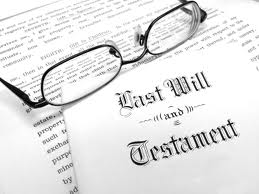If you have a will, have you looked at in the past couple of years and updated if necessary?
That’s important, but don’t assume that it’s enough to ensure that all your wishes are carried out in the event of your demise. It isn’t.
Naming the wrong people or failing to update those financial documents can create a mess for your heirs. A fact that many seem to miss is that beneficiary designations override wills. Unfortunately, too many families learn that too late, after a loved one died believing that his or her will took precedence over everything.
If it’s been years since you opened your accounts, you might not recall whom you designated as beneficiary on some of them. What if that person has died or others have been born since? What if your relationship has changed and you no longer want that person to get your money when you die? (Think marriage and divorce, the death of parents, birth of children or the breakup of an old friendship.)
Regardless of what your will states, whoever is named as beneficiary on the various financial accounts mentioned above is who will receive those specific assets. Period. End of story.
- Not naming a beneficiary. If you don’t name anyone, your estate becomes the beneficiary. That means the asset could be subject to a lengthy, expensive and cumbersome probate process—and people you might not prefer could wind up with the asset.
- Failure to list contingent beneficiaries. If your beneficiary dies first and you haven’t named a contingent (or secondary) beneficiary, it’s the same as having no beneficiary. If you and your spouse die at the same time (say, in an auto accident) and you’ve not named the kids as contingent heirs, your estates go into probate. Naming a contingent has another advantage, too: If the primary beneficiary doesn’t want the asset for some reason (perhaps because of tax implications), he or she can waive rights to it, allowing the money to pass to the contingent beneficiary. Many surviving spouses do this for their children, and it can be a smart way to avoid or reduce taxes. But if you fail to name a contingent beneficiary, this opportunity is lost.
- Lack of specifics. Simply listing “my children” as your beneficiaries can be a problem, especially in a blended family. Many states don’t recognize stepchildren when the word “children” is used. Or some family member you’ve lost contact with and with whom you don’t intend to share your assets could suddenly turn up and try to claim all or part of the estate. Finally, what happens if one child predeceases you? Unless you get specific, that child’s share will go to your other children instead of to that child’s children. Unless it’s your intent to disinherit some of your children or grandchildren, you need to be more specific.
- Using shortcuts. If you have three children and you want all three to receive an asset, you need to name all three as beneficiaries. Too often, we find that a client has listed only one child, believing that this person will then give the others their shares. That is a very big mistake. Even assuming the child is so inclined (legally, they don’t have to), the IRS might interfere by levying taxes on the amounts redistributed. Shortcuts are never a good idea with legal documents.
- Missing beneficiary designation forms. Let’s say your forms are on file with a custodial company but that firm is acquired by another in a merger. Records are sometimes lost or destroyed in that situation. Without a verifiable form to prove beneficiary status, the default provision of the plan applies, which often is: “spouse first, if living; then the estate.” Keep copies of your beneficiary forms in a safe deposit box, and make sure your financial advisor, estate attorney and executor have copies.
- Not considering the financial or emotional readiness of beneficiaries. Your heirs will get the money in your IRAs, retirement accounts, life insurance and annuities almost immediately upon your death, with no restrictions. If this worries you, consider naming a trust as beneficiary; then you can place limits on when and how the money is to be used.
You devoted a lifetime to accumulating assets, so make sure the disposition is managed the way you want them to be or your efforts could be for naught. That’s why it’s essential for you to take the time and the proper steps to work closely with an estate attorney and with your independent, objective financial advisor.
The information contained herein does not constitute tax or legal advice. Any decisions or actions should not be made without first consulting a financial professional or attorney.
For more information contact us at 845.563.0537 or Contact@CompassAMG.com
The author of this blog, Steven M DiGregorio is President of Compass Asset Management Group, LLC and an Investment Advisor Representative with Spire Wealth Management, LLC.
Spire Wealth Management, LLC is a Federally Registered Investment Advisory Firm. Securities offered through an affiliate, Spire Securities, LLC. Member FINRA/SIPC.



